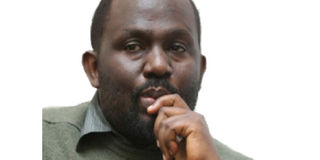Tongue-in-cheek: Goodbye age limit, long live Museveni

Last Thursday, the Constitutional Court ruled in favour of the amendment by Parliament that effectively enabled Yoweri Museveni to be president for life, although it knocked down the bit elongating the terms of legislators by two years from the current five. In the 4:1 majority decision, the lone dissenter was Justice Kenneth Kakuru.
I would have been very worried if the majority had ruled against the presidency for life. It would have meant that Uganda had become a very different country and we had totally missed the change!
Furthermore, if we hadn’t got a single dissent. For Kakuru represented an old stubborn enlightened Ugandan tradition, which refuses to die even when surrounded by the worst forms of darkness.
Someone argued recently that bribery is horrible, but what is worse is when it becomes unpredictable. If the bribe for getting a trading licence is Shs100,000, traders will plan for it and work into the price of goods they sell. They can survive that.
But if they went around to the trade office the next year to renew the licence, and found it was no longer Shs100,000 or hadn’t been adjusted for inflation to Shs115,000, but was now Sh750,000, they will find that crazy. Most will not pay it, and will likely close their business.
Likewise, if a Ugandan court were to overturn a president’s fraudulent election, or deny him a quest for indefinite presidency, there would be too much uncertainty in addition to it being out of national character. However, this should not be cause for despair.
There is power in understanding. You see, life presidency like the Museveni one, is the prefect “Mvule tree dilemma”. Over the years, I watched the fate of two giant mvule (African teak) near our village in Tororo.
Over the decades, they grew to be really big. One was on public land, so it grew too big a thief couldn’t steal it in the night. But also, because it was so huge – and therefore precious – a corrupt official couldn’t cut it down alone and pocket the proceeds.
It needed many officials to agree on action. It just stood there, dead, for many more years before it was cut. The second mvule tree, even bigger and on private land, still stands. It has a few leaves at the top, but since birds don’t even perch on it any more, the time to cut and replace it is long gone.
However, because it is so tall, it pauses potential danger to the houses near it. It can be cut professionally, of course, but it would mean tagging it to fall on an adjacent piece of land that doesn’t belong to the tree owner.
And because it is clearly a valuable tree, the land owner will almost certainly demand a cut of the sale price of the mvule.
And the tree owner would find that morally indefensible. So the mvule stands.
In the Museveni president for life project, the Constitutional Court ran into a mvule tree problem. A Big Man who has been in power for 32 years as Museveni has, stays in power because inertia favours him.
If you look around Africa, leaders who have been in the chair for that long have almost never been ousted at elections or by courts.
First, they rarely die in office, so the Grim Reaper is not an ally in the fight against a president-for-life.
However, disease and age – and related senility – are. Consider the case of DR Congo’s Mobutu Sese Seko in 1997. In power for 32 years, he was ravaged by cancer, weakening him and sapping his mind, as Congolese rebels backed by a Rwanda-led consortium, took to war against him.
He then inevitably made a series of bad decisions, including relying on his family as his war cabinet, to save his regime and failed.
In Zimbabwe, age, and ill-health did the same to Robert Mugabe. At 93, and in power for 37 years, his decision-making was in the gutter. He ran down the economy, tried to manoeuvre his wife Grace to succeed him, and antagonised the securocrats in the military and ruling Zanu-PF by sacking and trying to murder now-president Emmerson Mnangagwa, who was their representative at the high table. They combined to kick him out.
As Big Men (and people in general) age, they tend to rely more on family. As Mobutu, Mugabe, and Muammar Gadaffi in Libya and Hosni Mubarak in Egypt taught us, that reliance on family has revolutionary seeds in it because it hastens the Big Man’s and his regime’s demise.
So while longevity breeds advantages for strongmen, we should also pray that they have a long life marked by ill-health, that they become senile, rely more on family in their sunset years, and the courts allow them to go forward and self-destruct.
Mr Onyango-Obbo is the publisher of Africa
datavisualiser Africapedia.com and explainer site Roguechiefs.com. Twitter@cobbo3




